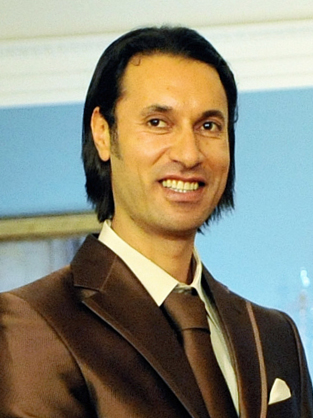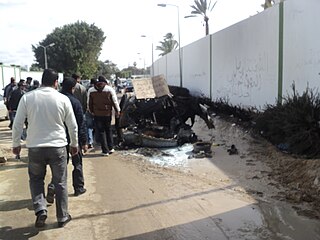
On 5 April 1986, three people were killed and 229 injured when La Belle discothèque was bombed in the Friedenau locality of West Berlin. The entertainment venue was commonly frequented by United States soldiers; two of the dead and 79 of the injured were Americans.

Human rights in Libya is the record of human rights upheld and violated in various stages of Libya's history. The Kingdom of Libya, from 1951 to 1969, was heavily influenced by the British and Y.R.K companies. Under the King, Libya had a constitution. The kingdom, however, was marked by a feudal regime. Due to the previous colonial regime, Libya had a low literacy rate of 10%, a low life expectancy of 57 years, with many people living in shanties and tents. Illiteracy and homelessness were chronic problems during this era, when iron shacks dotted many urban centres in the country.

The history of the Jews in Libya stretches back to the 3rd century BCE, when Cyrenaica was under Greek rule. The Jewish population of Libya, a part of the Sephardi-Maghrebi Jewish community, continued to populate the area continuously until modern times. During World War II, Libya's Jewish population was subjected to antisemitic laws by the Fascist Italian regime and deportations by both the Italian and German armies.

Mutassim Billah Gaddafi was a Libyan military officer, and the National Security Advisor of Libya from 2008 until 2011. He was the fourth son of former Libyan leader Muammar Gaddafi, and a member of his father's inner circle. His mother was Safia Farkash, who was said to be a Hungarian from Bosnia and Herzegovina.

the Abu Salim Prison massacre took place in Abu Salim prison, Libyan, on 29 June 1996, when thousands of Libyan prisoners were killed. The massacre is considered to be one of the deadliest massacres carried out by the Gaddafi regime.

Abu Salim prison is a maximum security prison in Tripoli, Libya. The prison was notorious during the rule of Muammar Gaddafi for alleged mistreatment and human rights abuses, including a massacre in 1996 in which Human Rights Watch estimated that 1,270 prisoners were killed.
Abdullah Senussi is a Libyan national who was the intelligence chief and brother-in-law of former Libyan leader Colonel Muammar Gaddafi. He was married to Gaddafi's sister-in-law.

The Khamis Brigade, formally the 32nd Reinforced Brigade of the Armed People, was a regime security brigade of the Libyan Armed Forces loyal to Muammar Gaddafi, the leader of Libya from 1969 until 2011. The 32nd Brigade was commanded by Gaddafi's youngest son, Khamis Gaddafi and was called "the most well-trained and well-equipped force in the Libyan military" and "the most important military and security elements of the regime" in leaked U.S. memos.

United Nations Security Council Resolution 1970 was a measure adopted unanimously by the UN Security Council on 26 February 2011. It condemned the use of lethal force by the government of Muammar Gaddafi against protesters participating in the Libyan Civil War, and imposed a series of international sanctions in response.
Khamis Gaddafi was the seventh and youngest son of former Libyan leader Muammar Gaddafi, and the military commander in charge of the Khamis Brigade of the Libyan Army. He was part of his father's inner circle. During the First Libyan Civil War, he was a major target for rebel forces trying to overthrow his father.

Moussa Ibrahim Gaddafi is a Libyan political figure who rose to international attention in 2011 as Muammar Gaddafi's Information Minister and official spokesman, serving in this role until the government was toppled the same year in the Libyan Civil War. Ibrahim held frequent press conferences in the course of the war, denouncing rebel forces and the NATO-led military intervention, often in defiant and impassioned tones. His status and whereabouts remained unknown following the Battle of Tripoli in which the Gaddafi government was overthrown, although there were several claims and subsequent refutations of his capture. Eventually, in late 2014, it was discovered he was in Egypt before he was deported and fled to Serbia. On 12 January 2015 Moussa Ibrahim spoke publicly by video link at a political event hosted at the Committee Rooms Houses of Parliament, Westminster, London from an undisclosed location, also the Director of Private Security Company.

The Battle of Tripoli, sometimes referred to as the Fall of Tripoli, was a military confrontation in Tripoli, Libya, between loyalists of Muammar Gaddafi, the longtime leader of Libya, and the National Transitional Council, which was attempting to overthrow Gaddafi and take control of the capital. The battle began on 20 August 2011, six months after the First Libyan Civil War started, with an uprising within the city; rebel forces outside the city planned an offensive to link up with elements within Tripoli, and eventually take control of the nation's capital.

By the end of February 2011, medical supplies, fuel and food were dangerously low in Libya. On 25 February, the International Committee of the Red Cross launched an emergency appeal for US$6,400,000 to meet the emergency needs of people affected by the violent unrest in Libya. On 2 March, the ICRC's director general reminded everyone taking part in the violence that health workers must be allowed to do their jobs safely.

Safia Farkash Gaddafi is a Libyan businesswoman. She is the widow of former Libyan leader Muammar Gaddafi, former First Lady of Libya and Representative of Sirte, and mother of seven of Gaddafi's eight biological children, some of whom participated in his regime.
Mansour Dhao Ibrahim is a Libyan former politician. He was a prominent figure in the Gaddafi government, serving as Muammar Gaddafi's chief of security until they were both captured. Dhao was the leader of the regime's People's Guard. He is Gaddafi's cousin.

Gaddafi loyalism, in a wider political and social sense also known as the Green resistance, consists of sympathetic sentiment towards the overthrown government of Muammar Gaddafi, who was killed in October 2011, and his Third International Theory. Despite Muammar Gaddafi's death, his legacy and Jamahiriya ideology still maintains a popular appeal both inside and outside Libya into the present day. Regardless, the Western sentiment has largely been that this continued support may contribute to some of the ongoing violence in Libya.

The Libyan crisis is the current humanitarian crisis and political-military instability occurring in Libya, beginning with the Arab Spring protests of 2011, which led to two civil wars, foreign military intervention, and the ousting and death of Muammar Gaddafi. The first civil war's aftermath and proliferation of armed groups led to violence and instability across the country, which erupted into renewed civil war in 2014. The second war lasted until October 23, 2020, when all parties agreed to a permanent ceasefire and negotiations.

The International Criminal Court investigation in Libya or the Situation in Libya is an investigation started in March 2011 by the International Criminal Court (ICC) into war crimes and crimes against humanity claimed to have occurred in Libya since 15 February 2011. The initial context of the investigation was the 2011 Libyan Civil War and the time frame of the investigation continued to include the 2019 Western Libya offensive.

The Battle of Bayda was the first conflict that broke out during the First Libyan Civil War between the brigades of Colonel Muammar Gaddafi and the Libyan rebels in the 4th-largest city in the country, the city of Bayda and its suburbs. The battle took place as a result of the demonstrations calling for the fall of the regime in Bayda, and after that the demonstrators clashed with the personnel of the internal security Agency in the city and the Talaa Khamis Brigade and the mercenaries and the Hussein Al-Jouifi Brigade stationed in Shahhat and Al Abraq International Airport in Bayda. The fighting continued one day in Bayda and the city was liberated, and then the Libyan revolutionaries headed to the outskirts of the city in Shahhat and Al-Abraq Airport. The revolutionaries were able to control the city and its suburbs, and thus Bayda was the first city to break out of Gaddafi's control and remained under the rebels' control throughout the revolution.
During Muammar Gaddafi's rule over Libya, many crimes against humanity were committed by government forces against the Libyan population. Some of these include extrajudicial killings, public executions, and the torture of civilians. These violations are what caused the Libyan population to revolt against the regime.















